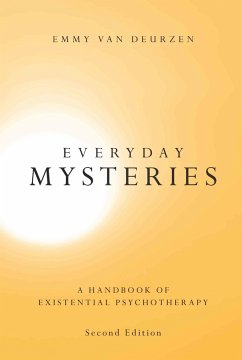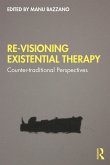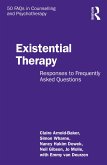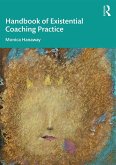Emmy van Deurzen (New School of Psychotherapy and UK Counselling)
Everyday Mysteries
A Handbook of Existential Psychotherapy
Emmy van Deurzen (New School of Psychotherapy and UK Counselling)
Everyday Mysteries
A Handbook of Existential Psychotherapy
- Gebundenes Buch
- Merkliste
- Auf die Merkliste
- Bewerten Bewerten
- Teilen
- Produkt teilen
- Produkterinnerung
- Produkterinnerung
This book provides an in-depth introduction to existential psychotherapy and offers a fresh perspective for anyone training in psychotherapy, counselling and psychoanalysis.
Andere Kunden interessierten sich auch für
![Everyday Mysteries Everyday Mysteries]() Emmy van DeurzenEveryday Mysteries42,99 €
Emmy van DeurzenEveryday Mysteries42,99 €![Re-Visioning Existential Therapy Re-Visioning Existential Therapy]() Re-Visioning Existential Therapy47,99 €
Re-Visioning Existential Therapy47,99 €![Existential Therapy Existential Therapy]() Claire Arnold-BakerExistential Therapy20,99 €
Claire Arnold-BakerExistential Therapy20,99 €![Existential Therapy Existential Therapy]() Susan Iacovou (private practice in Ches University of Derby OnlineExistential Therapy46,99 €
Susan Iacovou (private practice in Ches University of Derby OnlineExistential Therapy46,99 €![Existential Therapy Existential Therapy]() Emmy van DeurzenExistential Therapy21,99 €
Emmy van DeurzenExistential Therapy21,99 €![The Handbook of Existential Coaching Practice The Handbook of Existential Coaching Practice]() Monica HanawayThe Handbook of Existential Coaching Practice31,99 €
Monica HanawayThe Handbook of Existential Coaching Practice31,99 €![Existential Social Work Existential Social Work]() Zvi EisikovitsExistential Social Work40,99 €
Zvi EisikovitsExistential Social Work40,99 €-
-
-
This book provides an in-depth introduction to existential psychotherapy and offers a fresh perspective for anyone training in psychotherapy, counselling and psychoanalysis.
Hinweis: Dieser Artikel kann nur an eine deutsche Lieferadresse ausgeliefert werden.
Hinweis: Dieser Artikel kann nur an eine deutsche Lieferadresse ausgeliefert werden.
Produktdetails
- Produktdetails
- Verlag: Taylor & Francis Ltd
- 2 ed
- Seitenzahl: 384
- Erscheinungstermin: 2. Dezember 2009
- Englisch
- Abmessung: 244mm x 164mm x 33mm
- Gewicht: 724g
- ISBN-13: 9780415376426
- ISBN-10: 0415376424
- Artikelnr.: 29019355
- Herstellerkennzeichnung
- Libri GmbH
- Europaallee 1
- 36244 Bad Hersfeld
- gpsr@libri.de
- Verlag: Taylor & Francis Ltd
- 2 ed
- Seitenzahl: 384
- Erscheinungstermin: 2. Dezember 2009
- Englisch
- Abmessung: 244mm x 164mm x 33mm
- Gewicht: 724g
- ISBN-13: 9780415376426
- ISBN-10: 0415376424
- Artikelnr.: 29019355
- Herstellerkennzeichnung
- Libri GmbH
- Europaallee 1
- 36244 Bad Hersfeld
- gpsr@libri.de
Emmy van Deurzen is an existential psychotherapist, counselling psychologist and philosopher, who has published numerous books and who lectures internationally on a broad range of existential topics. She was the founder of Regent's College School of Psychotherapy and Counselling, of the Society for Existential Analysis and of the New School of Psychotherapy and Counselling in London, which she continues to direct. Her private practice, Dilemma Consultancy Ltd. is based in Sheffield and London.
Preliminary Remarks. Preface. General Introduction. Part I: Theory:
Philosophical Underpinnings. Sören Kierkegaard: A Very Individual Approach.
Friedrich Nietzsche: With Passion and Intensity. Edmund Husserl: Science of
a New Psychology. Karl Jaspers: The Way to Wisdom. Martin Heidegger:
Blueprint for Living. Martin Buber: Human Relations Reconsidered. Max
Scheler: The Human Heart and Inter-subjectivity. Jean-Paul Sartre: To Be or
Not to Be. Maurice Merleau Ponty: Embodied Living. Paul Tillich: A New
Spirituality. Other Philosophical Contributions. Female and Feminist
Contributions. Part II: Existential Dimensions: A Map of the World.
Worldviews, Paradoxes and Dialectics: A Copernican Revolution. The Physical
Dimension: Being with Nature. The Social Dimension: Being with Others. The
Personal Dimension: Being with Oneself. The Spiritual Dimension: Being with
Meaning. Part III: New Foundations for Psychotherapy. Introduction. Karl
Jaspers: Psychopathology. Eugene Minkowski: The Dimension of Time. Jacques
Lacan: The Role of Language. Ludwig Binswanger: The Beginning of
Existential Therapy. Medard Boss: Daseinsanalysis. Victor Frankl:
Logotherapy and the Search for Meaning. The American Contribution: May,
Bugental, Yalom and Others. Thomas Szasz: Social Dimension of Therapy.
Ronald Laing: Anti-Psychiatry. The British School of Existential Analysis.
Philosophical Consultancy. Part IV: Parameters of Existential
Psychotherapy. Objectives of the Approach. Ground Rules of Existential
Work. Consciousness and the Unknown. Therapeutic Dialogue. The Dynamic,
Multiple and Changing Self. Part V: Case Illustration. Rita's grief.
Conclusion.
Philosophical Underpinnings. Sören Kierkegaard: A Very Individual Approach.
Friedrich Nietzsche: With Passion and Intensity. Edmund Husserl: Science of
a New Psychology. Karl Jaspers: The Way to Wisdom. Martin Heidegger:
Blueprint for Living. Martin Buber: Human Relations Reconsidered. Max
Scheler: The Human Heart and Inter-subjectivity. Jean-Paul Sartre: To Be or
Not to Be. Maurice Merleau Ponty: Embodied Living. Paul Tillich: A New
Spirituality. Other Philosophical Contributions. Female and Feminist
Contributions. Part II: Existential Dimensions: A Map of the World.
Worldviews, Paradoxes and Dialectics: A Copernican Revolution. The Physical
Dimension: Being with Nature. The Social Dimension: Being with Others. The
Personal Dimension: Being with Oneself. The Spiritual Dimension: Being with
Meaning. Part III: New Foundations for Psychotherapy. Introduction. Karl
Jaspers: Psychopathology. Eugene Minkowski: The Dimension of Time. Jacques
Lacan: The Role of Language. Ludwig Binswanger: The Beginning of
Existential Therapy. Medard Boss: Daseinsanalysis. Victor Frankl:
Logotherapy and the Search for Meaning. The American Contribution: May,
Bugental, Yalom and Others. Thomas Szasz: Social Dimension of Therapy.
Ronald Laing: Anti-Psychiatry. The British School of Existential Analysis.
Philosophical Consultancy. Part IV: Parameters of Existential
Psychotherapy. Objectives of the Approach. Ground Rules of Existential
Work. Consciousness and the Unknown. Therapeutic Dialogue. The Dynamic,
Multiple and Changing Self. Part V: Case Illustration. Rita's grief.
Conclusion.
Preliminary Remarks. Preface. General Introduction. Part I: Theory:
Philosophical Underpinnings. Sören Kierkegaard: A Very Individual Approach.
Friedrich Nietzsche: With Passion and Intensity. Edmund Husserl: Science of
a New Psychology. Karl Jaspers: The Way to Wisdom. Martin Heidegger:
Blueprint for Living. Martin Buber: Human Relations Reconsidered. Max
Scheler: The Human Heart and Inter-subjectivity. Jean-Paul Sartre: To Be or
Not to Be. Maurice Merleau Ponty: Embodied Living. Paul Tillich: A New
Spirituality. Other Philosophical Contributions. Female and Feminist
Contributions. Part II: Existential Dimensions: A Map of the World.
Worldviews, Paradoxes and Dialectics: A Copernican Revolution. The Physical
Dimension: Being with Nature. The Social Dimension: Being with Others. The
Personal Dimension: Being with Oneself. The Spiritual Dimension: Being with
Meaning. Part III: New Foundations for Psychotherapy. Introduction. Karl
Jaspers: Psychopathology. Eugene Minkowski: The Dimension of Time. Jacques
Lacan: The Role of Language. Ludwig Binswanger: The Beginning of
Existential Therapy. Medard Boss: Daseinsanalysis. Victor Frankl:
Logotherapy and the Search for Meaning. The American Contribution: May,
Bugental, Yalom and Others. Thomas Szasz: Social Dimension of Therapy.
Ronald Laing: Anti-Psychiatry. The British School of Existential Analysis.
Philosophical Consultancy. Part IV: Parameters of Existential
Psychotherapy. Objectives of the Approach. Ground Rules of Existential
Work. Consciousness and the Unknown. Therapeutic Dialogue. The Dynamic,
Multiple and Changing Self. Part V: Case Illustration. Rita's grief.
Conclusion.
Philosophical Underpinnings. Sören Kierkegaard: A Very Individual Approach.
Friedrich Nietzsche: With Passion and Intensity. Edmund Husserl: Science of
a New Psychology. Karl Jaspers: The Way to Wisdom. Martin Heidegger:
Blueprint for Living. Martin Buber: Human Relations Reconsidered. Max
Scheler: The Human Heart and Inter-subjectivity. Jean-Paul Sartre: To Be or
Not to Be. Maurice Merleau Ponty: Embodied Living. Paul Tillich: A New
Spirituality. Other Philosophical Contributions. Female and Feminist
Contributions. Part II: Existential Dimensions: A Map of the World.
Worldviews, Paradoxes and Dialectics: A Copernican Revolution. The Physical
Dimension: Being with Nature. The Social Dimension: Being with Others. The
Personal Dimension: Being with Oneself. The Spiritual Dimension: Being with
Meaning. Part III: New Foundations for Psychotherapy. Introduction. Karl
Jaspers: Psychopathology. Eugene Minkowski: The Dimension of Time. Jacques
Lacan: The Role of Language. Ludwig Binswanger: The Beginning of
Existential Therapy. Medard Boss: Daseinsanalysis. Victor Frankl:
Logotherapy and the Search for Meaning. The American Contribution: May,
Bugental, Yalom and Others. Thomas Szasz: Social Dimension of Therapy.
Ronald Laing: Anti-Psychiatry. The British School of Existential Analysis.
Philosophical Consultancy. Part IV: Parameters of Existential
Psychotherapy. Objectives of the Approach. Ground Rules of Existential
Work. Consciousness and the Unknown. Therapeutic Dialogue. The Dynamic,
Multiple and Changing Self. Part V: Case Illustration. Rita's grief.
Conclusion.








